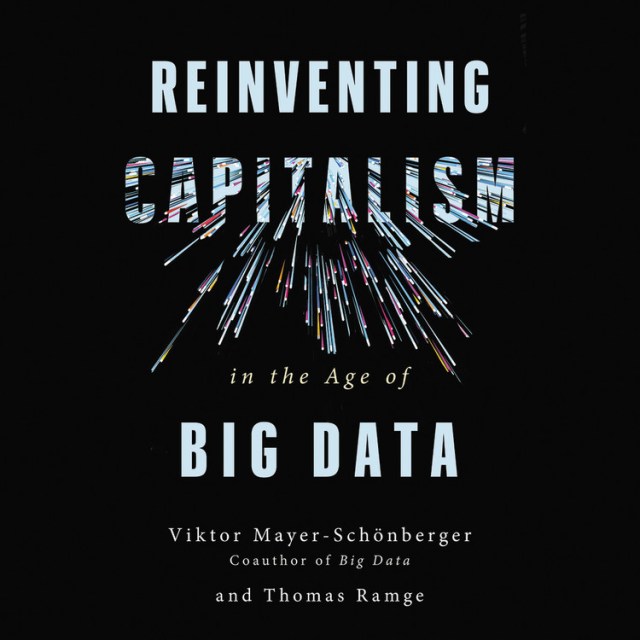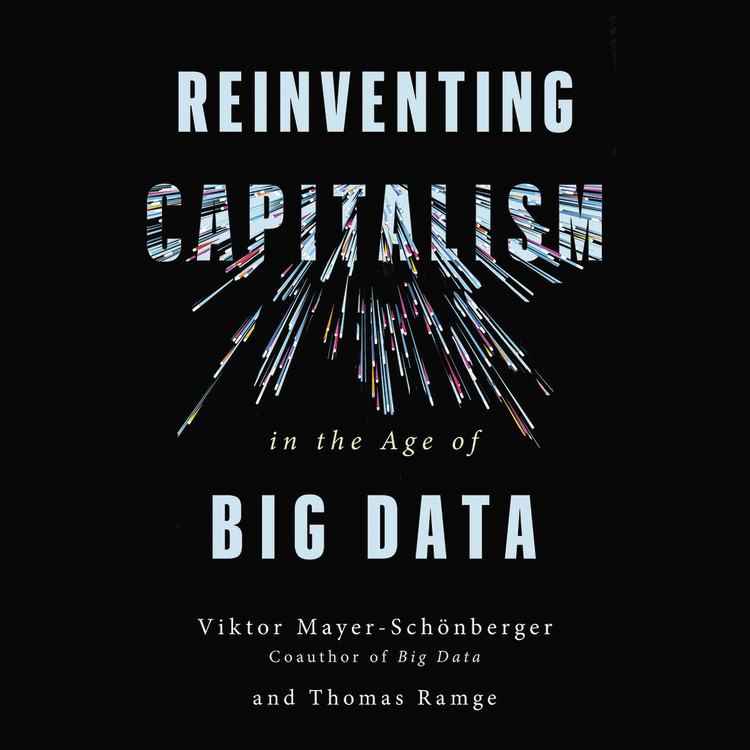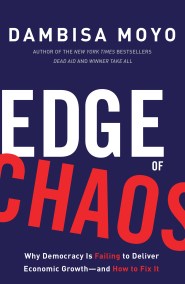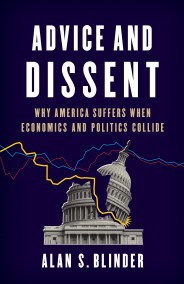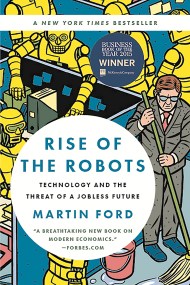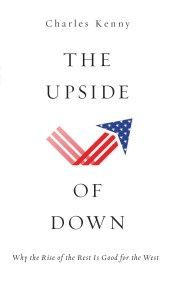By clicking “Accept,” you agree to the use of cookies and similar technologies on your device as set forth in our Cookie Policy and our Privacy Policy. Please note that certain cookies are essential for this website to function properly and do not require user consent to be deployed.
Reinventing Capitalism in the Age of Big Data
Contributors
By Thomas Ramge
Read by John Chancer
Formats and Prices
- On Sale
- Feb 27, 2018
- Publisher
- Hachette Audio
- ISBN-13
- 9781478923862
Format
Format:
- Audiobook Download (Unabridged)
- ebook $16.99 $21.99 CAD
- Hardcover $28.00 $36.50 CAD
This item is a preorder. Your payment method will be charged immediately, and the product is expected to ship on or around February 27, 2018. This date is subject to change due to shipping delays beyond our control.
Buy from Other Retailers:
In modern history, the story of capitalism has been a story of firms and financiers. That’s all going to change thanks to the Big Data revolution. As Viktor Mayer-Schörger, bestselling author of Big Data, and Thomas Ramge, who writes for The Economist, show, data is replacing money as the driver of market behavior. Big finance and big companies will be replaced by small groups and individual actors who make markets instead of making things: think Uber instead of Ford, or Airbnb instead of Hyatt.
This is the dawn of the era of data capitalism. Will it be an age of prosperity or of calamity? This book provides the indispensable roadmap for securing a better future.
-
"Viktor Mayer-Schönberger and Thomas Ramge argue that big data will transform our economies on a fundamental level...Thought-provoking."Science
-
"A thoughtful volume about the digital and data-driven future...Emphasizes the human choices and market and societal opportunities that data will enable."Forbes
-
"Mayer-Schönberger and Ramge offer several intriguing ideas for limited the excesses of data-rich capitalism...These ideas won't get much of a hearing in today's Washington. But the shift toward an information-based economy will outlast the current administration. Eventually, this country will have a government interested in the best parts of modern capitalism while restraining the worst."David Leonhardt, New York Times Book Review
-
"[One of] this year's best business books on technology and innovation"James Surowiecki, Strategy + Business
-
"If this overall analysis is right, then we are going to have to start thinking more about such radical ideas. Data capitalism can deliver phenomenal services, as Amazon has shown. But it may also undermine some of the foundations on which our societies have been built."Financial Times
-
"In 2013's Big Data, Viktor Mayer-Schönberger...described the necessity of using digital information to better connect with customers and train automated systems... Reinventing Capitalism in the Age of Big Data...expands that vision as dramatically as the title implies. Big data, the authors argue, is an omnipresent force that will create a new world--one in which large public companies may no longer be relevant at all."Fortune
-
"Smoothly written and provocative, Reinventing Capitalism in the Age of Big Data is one of those rare pop future books that takes fundamental economics seriously... Viktor Mayer-Schönberger and Thomas Ramge argue that the data's rise means money's decline, that meaningful economic growth overwhelmingly depends on data innovation, and that regulating market competition requires rethinking data access."F&D
-
"A welcoming and comprehensible narrative featuring interesting profiles of key personalities driving the Big Data revolution...The future marketplace of goods, services, and ideas will benefit from a wide readership of this instructive study."Booklist
-
"An unnerving yet plausible portrait of a future in which 'finance capitalism will be as old-fashioned as Flower Power.'"Kirkus
-
"Anyone interested in the future of business should read this fascinating book as soon as possible. By now it is conventional wisdom--thanks in no small part to Mayer-Schönberger's previous book--that big data will transform the way firms operate. Reinventing Capitalism in the Age of Big Data makes a compelling case that it will change the nature of the market itself. With brilliant insights, it explains how the shift from simple price signaling to data-rich preference matching will determine the winners and losers of the 21st century economy, and thoughtfully outlines steps to curb the excesses of this new environment."Kevin Werbach, The Wharton School, University of Pennsylvania
-
"Reinventing Capitalism is a stunning and extremely provocative sketch of a world where data flows replace money flows and where data becomes a new kind of currency and provokes a new kind of capitalism. I highly recommend this astounding book that will help us all reimagine what capitalism could become in our new, data centric, AI based world."John Seely Brown, Former Chief Scientist, Xerox Corp; Former Director, Xerox Palo Alto Research Center (PARC); and Co-author of Design Unbound
-
"In the past 20 years, the big platform players of the digital economy have reaped huge profits. This book explains how we can turn data-richness into a win for everyone in society. A must-read for all who believe in competition and fair distribution of wealth."Don Tapscott, author of The Digital Economy, Wikinomics, and Blockchain-Revolution
-
"That data are a valuable resource is widely recognized. But ideas on how best to organize a data economy are far and few between. This book offers plenty of food for thought."Ludwig Siegele, Technology Editor of The Economist
-
"Digitalization is challenging us to re-think the future of our economy. This thought-provoking book provides excellent insights and guidance."Henning Kagermann, former CEO of SAP and President of Acatech at the National Academy of Science and Engineering
-
"It's vogue today to proclaim the 'death of capitalism'--and yet the one truly global system is going through profound reinvention as a combination of technological forces reshape every aspect of our economic, political and social lives. This book is an absolutely essential guide to our collective digital future and equally importantly, a sensible manifesto to shape it for everyone's benefit."Parag Khanna, author of Connectography: Mapping the Future of Global Civilization and Technocracy in America: Rise of the Info-State
-
"This refreshingly optimistic book, full of fascinating examples, shows how the digital age can lead to a future of data-rich markets that empower individuals and improve our lives in a diverse and inclusive society."Urs Gasser, professor and executive director, Berkman Klein Center for Internet & Society, Harvard
-
"For a generation, information technology has progressively driven down transaction-costs and displaced a universal tradeoff between richness and reach. This landmark book takes that logic to an entirely new plane, where the richness of data merges with the open and unbounded reach of markets. The possibility of data-rich markets is a vision that should challenge and inspire every corporate strategist and public policy maker."Philip Evans, Senior Advisor at The Boston Consulting Group and BCG Fellow
Newsletter Signup
By clicking ‘Sign Up,’ I acknowledge that I have read and agree to Hachette Book Group’s Privacy Policy and Terms of Use
